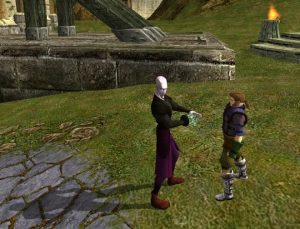
Recently, an online video game community rep was run off Twitter by “fans.” The CM’s fellow game dev shared how upset she was that said employee friend had been harassed. It’s sadly not uncommon in our industry – and it needs to stop.
Social media brings down the barrier between game developers and fans. When you’re frustrated that your favorite hobby is threatened, you don’t want to just scream into the void; you want to feel seen and heard. Heck, I often feel the same way, despite being able to occasionally talk to devs!
But there’s a right way to do it and a wrong way. And one of the worst ways to do it is to harass the people in the middle.
Before I go on, I want you to think about your own job. How far up the food chain are you? How much change could you really enact if an angry customer were to come up and yell suggestions or complaints in your face?
I’ve held various positions, but even when I was an editor, there were things that I had no say over – I could only pass it along to the higher-ups. Getting mad at me, personally, changed nothing except made me less able and willing to pass it up the chain. Yes, upon reflection I may be able to see a point in the vitriol, but I’ve certainly seen co-workers miss those opportunities because the presentation attacked them. I can’t change the way the airline sells tickets, tell you why the online order you put in has the wrong flower arrangement, or retrieve your MMO account info for you. (Yes, people really email us for this.)
So when a player yells about class nerfs or how much a new sword is ruining the game to, say, the social media handler for the company, I have to wonder what they’re expecting to come of it. Does the fan simply not know whom else to turn to because the community managers who often serve as a link between devs and fans seem to be fading into the background more and more? I do get the frustration when the CM disregards community concerns, but far more do I blame game teams/companies/publishers for stifling direct conversation with fans. In neither case is harassment justified.
 Devs, I know there are a million ignorant voices often yelling at you. Most people have never coded a simple quest scenario, much less made a whole game on something as basic as RPG Maker, and even I know that what people say is often at odds with what they do. But having that outlet at least helps people feel heard. Your CM can at least bring you community concerns and write them up as your replies. Yes, you may look bad. Yes, it may make people even madder. But we all know how often a developer has listened quietly to social media and tried to come up with a solution in secret. Yes, we’ve all been surprised, but tone deafness is a big deal.
Devs, I know there are a million ignorant voices often yelling at you. Most people have never coded a simple quest scenario, much less made a whole game on something as basic as RPG Maker, and even I know that what people say is often at odds with what they do. But having that outlet at least helps people feel heard. Your CM can at least bring you community concerns and write them up as your replies. Yes, you may look bad. Yes, it may make people even madder. But we all know how often a developer has listened quietly to social media and tried to come up with a solution in secret. Yes, we’ve all been surprised, but tone deafness is a big deal.
CMs aren’t supposed to be punching bags, but that’s how it often ends up. If the executives and leads at the top of the decision-making process can’t put out statements that at least make it look like they want to hear from fans (even if they simply hide behind piles of profits built by an angry community), then maybe they don’t deserve to be in those positions. I have personally seen multiple games crash and burn, not because they were bad, but because angry players who never felt heard spread the word that the game was trash. (Endless anger over the NGE and SOE’s mismanagement of its own community was actually the big reason I didn’t experience Star Wars Galaxies until its final years.)
Connecting decision-makers to fans is hard, but it’s also where PR and media come into play. Let me mention two “interviews” I had with Bill Roper in 2018 about SpatialOS: the PR version and the direct version. The questions I directly put to Roper in person got some good answers I felt like we as a community could really talk about. He’s one of the best devs I’ve ever interviewed, despite how some members of the community feel about him. However, the PR-sanitized email interview we got back sounds like something from a totally different person. That’s the stuff that annoys both fans and press. Something like a quarter of my questions often come directly from seeing fans repeatedly ask questions the company won’t answer.
 Then again, I’ve talked to devs who’ve really been a bit more forward than they should have. Some get too far into details most readers probably don’t care about, or they share personal stories that should have stayed personal. PR handlers can help them from getting overextended and making promises studios can’t keep. But over-sanitization can do a lot of damage, not just in angering fans but in irritating the very media and influencers who are honestly covering the story. When devs throw up smoke and mirrors to hide the blunders of their bosses, no one wins. So believe me when I say that this part of the game industry annoys the heck out of me.
Then again, I’ve talked to devs who’ve really been a bit more forward than they should have. Some get too far into details most readers probably don’t care about, or they share personal stories that should have stayed personal. PR handlers can help them from getting overextended and making promises studios can’t keep. But over-sanitization can do a lot of damage, not just in angering fans but in irritating the very media and influencers who are honestly covering the story. When devs throw up smoke and mirrors to hide the blunders of their bosses, no one wins. So believe me when I say that this part of the game industry annoys the heck out of me.
But gamers need to understand that PR people aren’t there to make changes to games. The community manager can’t revoke the upcoming class changes. The marketing department can’t change monetization. That customer support lady will always have to escalate your ticket to technical support for those weird bugs, and sometimes even then you won’t get help. There’s no point to treating someone as hostile from the start, especially if that person handles non-technical, non-monetization aspects of the game. It’s not just toxic, which is bad enough; it doesn’t even get you the result you want.
I’m not saying you shouldn’t voice your concerns. You should. But remember who you’re talking to. Don’t forget their humanity. I have gained immense respect for many of the devs who are willing to honestly engage in critical discussions with me, especially because you, our readers, give us some really tough questions to bring to them. So remember that many of the game reps don’t have a lot of power but will do what they can to help. It may just be wink or a nod to show that they’re on our side and are doing what they can to pass the message along, but they exist and they make themselves known – if you treat them with kindness.
 I know it’s the internet and this will always be a problem, but really, harassment doesn’t help. Insults, threats, spam, brigades, all of that is counter-productive, especially when it’s aimed at an individual community rep. It’s hard to want to help someone you perceive as the enemy, even if you’re wise enough to understand that it’s not you but your bosses they’re mad at. Even your Change.org petitions get seen by devs and CMs – it’s just that the decision-makers don’t care.
I know it’s the internet and this will always be a problem, but really, harassment doesn’t help. Insults, threats, spam, brigades, all of that is counter-productive, especially when it’s aimed at an individual community rep. It’s hard to want to help someone you perceive as the enemy, even if you’re wise enough to understand that it’s not you but your bosses they’re mad at. Even your Change.org petitions get seen by devs and CMs – it’s just that the decision-makers don’t care.
So at the end of the day, what’s an angry fan to do? Talk. Calmly and rationally. Even if the company heads don’t know about a critical bug causing the final raid boss’s health to reset, yelling at them on Twitter about not knowing their own game isn’t going to make them want to help you. They’ll just want you out of their face. They’ll just make themselves even less approachable in the future.
Now imagine pulling that on a community manager who doesn’t even work in the same building as the executives and decision-makers. Why would they represent you to their bosses when you’re harassing them? Here’s what they’re thinking when you stalk them to Twitter and screech about design decisions: “The community is toxic. I don’t know how much longer I can put up with them.” That’s how we lose good people from the industry. So fans, try to have a dialogue. You might even learn something, especially if you can get your message to the right person.
 Everyone has opinions, and The Soapbox is how we indulge ours. Join the Massively OP writers as we take turns atop our very own soapbox to deliver unfettered editorials a bit outside our normal purviews (and not necessarily shared across the staff). Think we’re spot on — or out of our minds? Let us know in the comments!
Everyone has opinions, and The Soapbox is how we indulge ours. Join the Massively OP writers as we take turns atop our very own soapbox to deliver unfettered editorials a bit outside our normal purviews (and not necessarily shared across the staff). Think we’re spot on — or out of our minds? Let us know in the comments!














